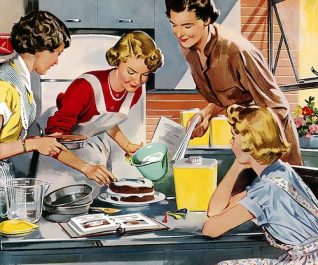Millennial Men Are Game For Stay-At-Home Wives

In a study conducted by the Council on Contemporary Families, in 2014, 58 percent of high school seniors said they are for the more traditional style family where the husband provides the household income and the wife stays home, raises the children and tends to the house.
Not only should the man be the sole breadwinner, roughly 40 percent of seniors also said the man of the house should make the important decisions for the family.
In 1994 those in the same age bracket were asked the above questions and the results were more aligned to what would have been expected today.
Only 42 percent of seniors believed the wife should stay home, and fewer than 30 percent said only the husband should be responsible for making decisions on the family’s behalf.
Overall, the idea of a traditional household seems to be supported by young millennials today. In 1994, 83 percent of young men said they rejected the idea that women should be stay-at-home moms, whereas in 2014, only 55 percent rejected the idea.
What’s the cause behind young men veering toward a more traditional family life, even before they have started one? One idea is due to the financial crisis of 2008.
During the crisis many high-powered businessmen lost their jobs and income when a slew of companies went out of business or laid off most of their employees.
During that time women either went back to work or held onto their jobs in order to help keep the family above water. It was a similar example of when WWII called for men to be drafted and women to fill their seats in factory jobs.
The new role of income earner gave women a sense of identity some enjoyed, but left some men possibly feeling emasculated in the process.
The same theory applies to today’s young millennials and the idea that they must assume the role they saw taken away from their fathers.
Another idea behind the spike in millennial men leaning toward a more traditional family life is perhaps those who support the structure came from a family where both parents worked full-time.
Latchkey kids were those who came home to an empty house because both parents were working when the kids came home from school.
A term coined in the 80s, many children growing up in the 2000s also had a similar upbringing. It’s this reason why some millennials say they want to go back to a more traditional household.
Having one parent at home helps make the home life less stressful, especially when American parents are the unhappiest, according to Vogue.
As millennials begin their own families only time will tell which family structure they implement and becomes the new trend of their time.
